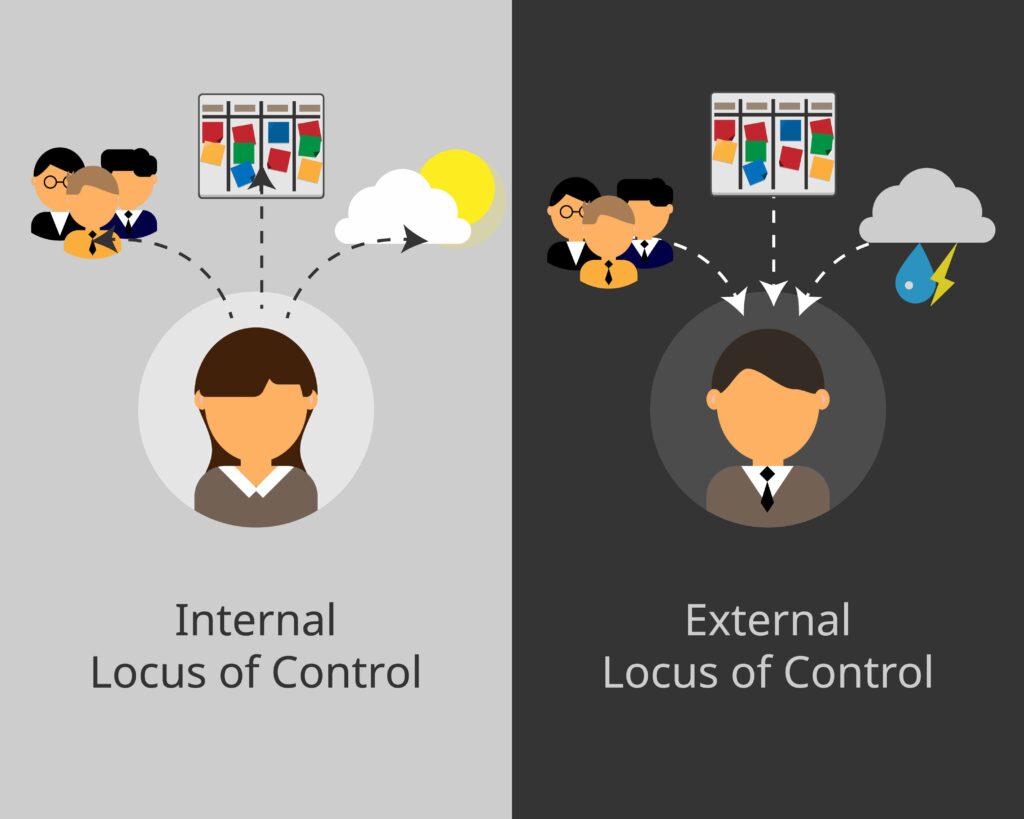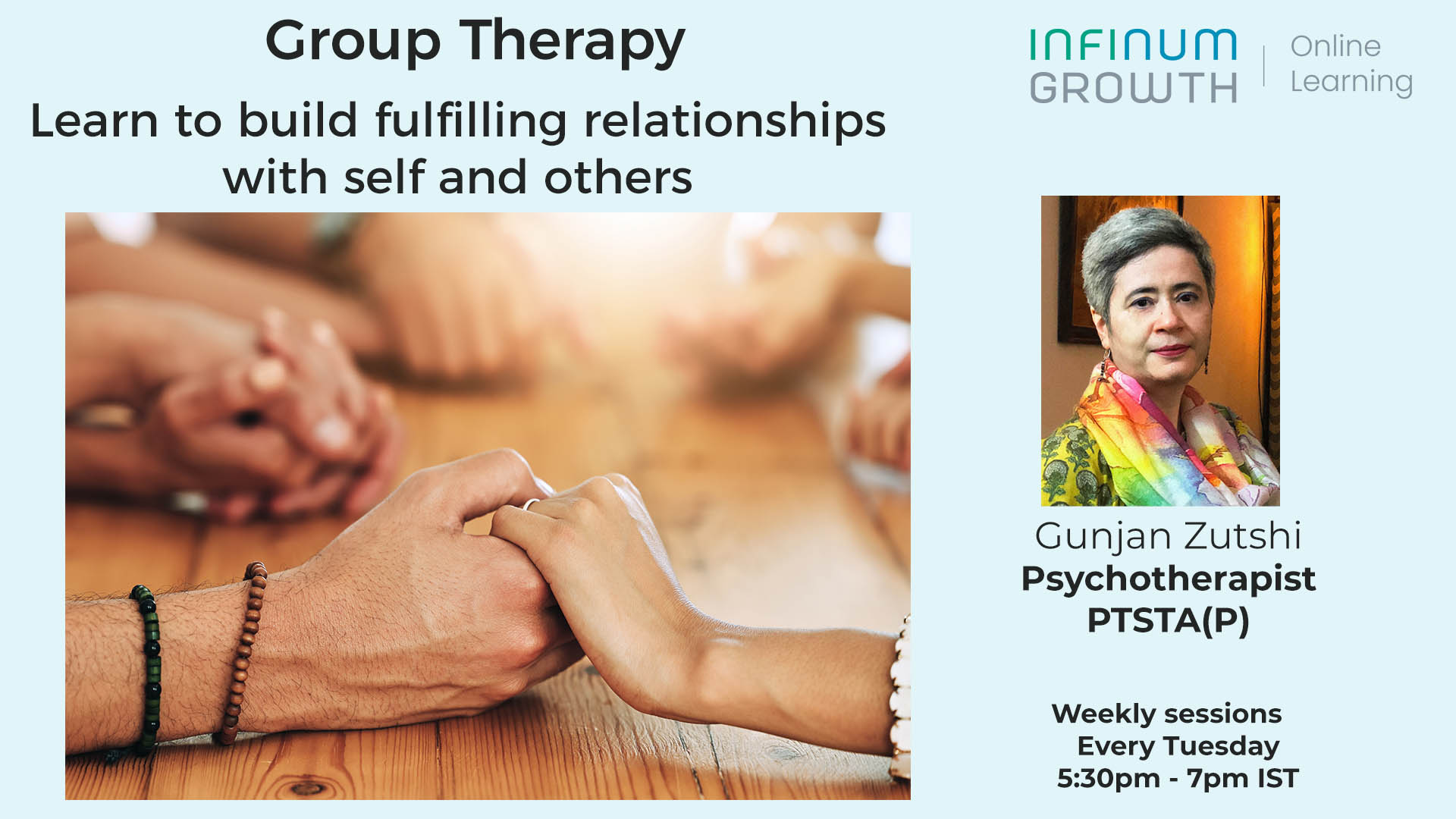Locus of control, a concept developed by Julian B. Rotter in 1954, is the degree to which people believe that they themselves, as opposed to external influences, have control over the outcome of events in their lives.
Internal and External Locus of Control
All individuals will have specific internal locus of control expectancies in some circumstances; and specific external locus of control expectancies in others.
If they have learned, through past experiences, that outcomes are at least partly dependant on their own actions, there will be a generalized internal locus of control expectancy. Similarly, it will be the opposite case for a generalized external locus of expectancy.*
Why is Internal Locus of Control important?
So, why is it important to build an internal Locus of Control? Research has shown that those with an internal locus of control tend to be happier, less stressed and more empowered in many situations in life and at the workplace.**
Differences between people with internal and external locus of controls, in terms of their achievement motivation, also suggest that internal locus is linked with higher levels of need for achievement.
Most people are somewhere on the spectrum between having a totally internal vs a totally external locus of control. People with a mix of internal and external loci, to a greater or lesser extent, depending on where they are on the spectrum, will take personal responsibility for their actions. The remaining are capable of relying upon and having faith in, resources and forces directly out of their control.
Clearly, it is better for us as individuals, to have a greater internal locus of control than external.
How does one increase their Internal Locus of Control relative to External?
Here are a few things one could be mindful of:
1. Define your values & personal beliefs
For many, especially children, adolescents and young adults, this might be a more difficult thing to do; simply because they may still be on the journey of discovering and evaluating their value system and personal beliefs.
Certainly those in the identity achievement status would find it easier to articulate them. But they too could experience a change if they go through a crisis and re-evaluate their values, beliefs and identity. For most of us however, there would usually be a few core beliefs and values that we may find non-negotiable.
If one values honesty, for example, one can’t consider a choice that would entail acting in a dishonest manner.
2. Becoming aware of our choices and accepting them
In every situation, there are always choices available to us. Not choosing to do anything about our situation is also a choice! But the important thing to realize is that, there will always be choices; even though these may be choices that one doesn’t like or are less than optimal.
But just the act of realizing and accepting the fact that one has choices to change their situation (even if the choice is to just change your attitude towards the situation), can be liberating and empowering and start one on the path to take more action.
3. Systematically evaluate your choices
Making a list of all possible courses of action and then systematically evaluating them, can be helpful in reminding one of their choices and keeping them from feeling trapped. This process can simply lay out what one can control, even when there are many things that one can’t.
The process would also give someone a clear view on the extent to which their choices and actions can impact the outcome. For example, students may realize that they can’t control what questions they would be asked in an exam, but controlling their study strategy will give them greater confidence and control on the ability to answer any questions on the subject matter.
4. Ask for Help
Being too close to the situation could sometimes cloud one’s visibility on choices. Our trusted external network and sometimes specialists like counsellors or therapists, coming from a position of concern for one’s well-being, are able to shed more light on situations and help us see our choices and situations from a different perspective; or indeed see choices that we were unaware that we had.
Whether or not we agree with their point of view or their opinion of the choices in front of us, it is always important to consider and evaluate them impartially anyway. Then, seeing new possibilities may become more of a habit. But it is important to understand that ultimately your choices must reflect your own self-interest and goals, and no one else’s.
5. Embrace Failure***
One could take failure as an opportunity to learn; it is most likely to happen sooner or later when we try to accomplish something that is challenging. People with an external locus of control will avoid situations, if they believe that there is even a slight chance of failure.
One way to increase one’s internal locus of control is to go out and do something that you know will result in failure; and follow up that failure by examining the factors that you could control and improve, that might change the outcome next time. Over time, this exercise will increase one’s internal locus of control.
6. Spend time in Self-Introspection
Introspection is a great tool to take some time out and understand ourselves better. Spending time with ourselves will help to focus on what we want and how we understand the choices in front of us. It will help to silence the influences from our external networks and the world outside in general; and, listen to our own thinking and opinions about issues.
Apart from simply thinking about things in silence, some very effective exercises for spending time with oneself include practicing meditation or mindfulness, reading books on varied subjects, writing/keeping a journal, volunteering or even experimenting with hobbies and joining different interest groups.
Those who believe that their Locus of Control is internal, will continue to make choices and take action based on their belief that they have greater control on the outcomes.
They will have greater success in building and committing to an identity that they perceive to be true to who they are. They will be less impacted by external expectations and perceptions or indeed their own perceptions of the world around them.
Ultimately, having a greater internal locus of control will positively impact your lifestyle and occupation choices. You will feel more in control of the outcome of your choices such that they are more aligned with your own identity definition and values systems.
It will reduce your overall dependency on external factors around you and make you less fearful of saying yes to choices that may be new to you or not conform to popular perception.
* Identity Status and Locus of Control: A Meta-Analysis, Kjersti R. Lillevoll, Jane Kroger &Monica Martinussen, 2013
** Ramezani SG, Gholtash A. The relationship between happiness, self-control and locus of control. Int J Educ Psychol Res. 2015;1:100-4. doi:10.4103/2395-2296.152222
*** https://www.entpathways.com/blog/2020/5/18/3-ways-to-increase-your-locus-of-control
This article is an extract from Kadambari Rao Batra’s upcoming book, which examines the idea of Individuality, Conformism and Choices, in the context of the Corporate Sector.
Please do leave your comments at the bottom and do share with others if you like this article.



















Very well written article. The need of the hour is to introspect and not look for happiness externally. It had given me self confidence once I made peace with my past, my surroundings and removed the negativity from the outer world. Point no 2 & 4 are so critical but mostly missed out due to our ego. Thank you for such a beautiful writing.